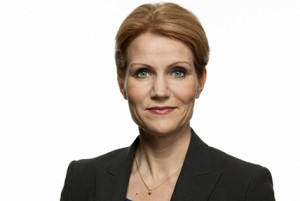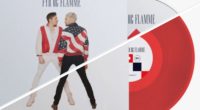
The morning after the Danish parliament election the coming prime minister, Helle Thorning Smith, found herself being used in a new cover version of the Danish entry from 1990 Hallo Hallo. The cover version adress several of the challenges Helle is now facing before she can present her new government.
Despite her party, the socialdemocrats (equal to England’s labour) going back with one seat there is no doubt that Helle Thorning-Smith will become Denmarks next – and the country’s first female – prime minister.
The Danish 1990 Eurovision Song Contest entry Hallo Hallo has been made into a satirical version with the simple title Helle. It is is in Danish, but EuroVisionary will guide you through it here:
It starts out saying that she will now be able to call herself prime minister despite the newspaper, BT’s fantacies. This newspaper has over the past year digged a lot in her husband, British Stephen Kinnock’s tax situation. He is the son of former English Labour leader Neil Kinnock. Stephen is not paying taxes in Denmark and during the election campaign it was found out that Helle has used his tax deduction for 8 years despite him not paying taxes and she therefore not being entitled to this. This however meant little to the voters who still voted on her to be Denmark’s next prime minister, but as the song also says then it was more because her support parties had a good election: "But there is one thing you must not forget, it was not you who won, it was the 3 other girls". That it will be tough negotiations Helle will be going through is also adressed in the song: "They say helle Helle, you won with our votes, it is us who puts you at your throne – there is no use in forgetting that without us you were nothing".
The song then goes into the fact that she needs to combine some parties now who have many things they disagree on: "Before the election came you could close your eyes for it, no one talked much about your disagreements. You stood together with Margrethe and with Willy, you stood together, you were brothers, like Kain and Abel". Margrethe Vestager is the leader of the mid party who had a great election. On the econimical politics she is more on the line of the Liberal and the Conservative. Willy Søvndal is the leader of the Socialist and his political line matches a bit better with Helle Thornings. Kain and Abel are the Danish names of Cain and Abel, the two sons of Adam and Eve.
The song continues talking about how she could not beat Anders Fogh 4 years ago. This is a reference to the former Danish prime minister Anders Fogh Rasmussen who left his position two and a half years ago to become the Secretary General of NATO. At the election 4 years ago Helle was rather new as the leader of the social democrats, but had given the promise that she could beat Anders Fogh, but instead she managed a result that back then was the worst result for the party in 104 years. Now she gave them their worst result in 108 years, but still becomes prime minister. That despite that the largest opposition party, Venstre (the liberals) had a good election, gained a few seats and become the largest party in the parliament.
The song ends with this: You can call yourself for the winner, but that does not change your situation. Helle, Helle. You have to reach many women, from Jelved to Ole Sohn. You have to reach further than "Storebæltsbroen" (the bridge that combines Funen with Sealand). Poor Helle. You are in government with your own opposition.
Marianne Jelved is the former leader of the mid party who will now go in government with Helle Thorning despite being more in agreement with the Liberals and the Conservative. Ole Sohn is on the different end of the scale as he was the leader of the Danish Communists up until the Sovjetunion fell apart in 1991. His party will also go in government with Helle Thorning-Smith.
You can listen to the song via this direct link to the DR radio programme, Selvsving, that published the song this morning – the song starts after 53 seconds and ends after 3 minutes.




















